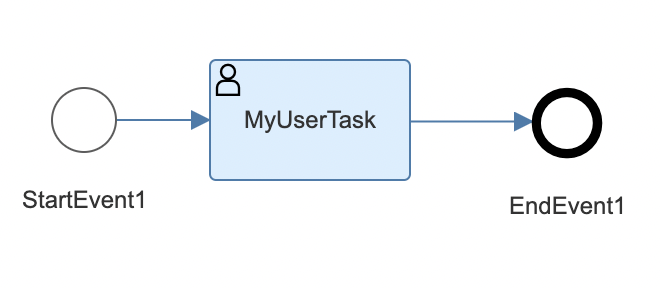Use the Pregenerated Workflow API Client for Cloud Foundry
The SAP Workflow service allows you to automate business processes across organizations and applications on SAP Business Technology Platform, both Cloud Foundry and Neo environment. It is technically separated into two services per environment:
- Inbox API (OData)
- Workflow API (OpenAPI)
The Inbox API is mainly meant to build a personal inbox, while the Workflow API helps to manage workflows and tasks across recipients.
The first SAP Cloud SDK pregenerated OpenAPI client is for the Workflow API. There is no pregenerated client for the Inbox API, yet. The remainder of this document refers to the OpenAPI Workflow API for Cloud Foundry only.
The following documentation explains how to use the pregenerated client for:
- An existing instance of the SAP Workflow service
- A user, who has the necessary roles to make the requests
- An existing workflow definition that contains one simple user task
To learn how to set up your environment for the SAP Workflow service, see the Workflow service documentation.
Installation
The client for the Workflow API is available as an npm package. To install it, run:
$ npm install @sap/cloud-sdk-workflow-service-cf
Use the Client
For this example, assume the following workflow definition:

It contains one task definition to approve a request through a form with one boolean field, approve.
The use case shows how to initiate a workflow, retrieve its tasks, complete a task, and retrieve the execution logs.
Start a Workflow
First, import the WorkflowInstancesApi from the Workflow API client.
This API includes functionality to manage workflow instances.
It allows you to start an instance of a workflow for an existing definition.
Use the startInstance function to build a request to start a workflow instance for the definition with the ID 'myWorkflowDefinitionId' and execute it against a destination:
import { WorkflowDefinitionsApi } from '@sap/cloud-sdk-workflow-service-cf';
function startWorkflow(): Promise<WorkflowInstance> {
return WorkflowInstancesApi.startInstance({
definitionId: 'myWorkflowDefinitionId'
}).execute(destination);
}
The returned workflow instance looks something like this:
{
"id": "<workflowInstanceId>",
"definitionId": "myworkflow",
"definitionVersion": "2",
"subject": "MyWorkflow",
"status": "RUNNING",
"businessKey": "",
"parentInstanceId": null,
"rootInstanceId": "<workflowInstanceId>",
"applicationScope": "own",
"startedAt": "2021-05-28T07:54:14.492Z",
"startedBy": "<serviceClientId>",
"completedAt": null
}
It contains information on the started workflow, for example, id, the ID of the instance, defintionId, the ID of the definition, and status, which in this case is 'RUNNING'.
Retrieve Tasks of a Workflow Instance
To get the tasks that are part of an instance, use the UserTaskInstancesApi.
It includes functionality around managing user tasks.
To retrieve the tasks of a workflow, use the queryInstances function and pass the workflow instance ID as query parameter to filter the tasks by your workflow instance.
Execute the request against a destination:
import { UserTaskInstancesApi } from '@sap/cloud-sdk-workflow-service-cf';
async function getTask(
workflowInstance: WorkflowInstance
): Promise<TaskInstance> {
const [taskInstance] = await UserTaskInstancesApi.queryInstances({
workflowInstanceId: workflowInstance.id
}).execute(destination);
return taskInstance;
}
The function above returns an instance of a task, that looks as follows:
{
"activityId": "usertask1",
"claimedAt": null,
"completedAt": null,
"createdAt": "2021-05-28T07:54:14.748Z",
"description": null,
"id": "<userTaskInstanceId>",
"processor": null,
"recipientUsers": ["<userId>"],
"recipientGroups": [],
"status": "READY",
"subject": "Approve a request",
"workflowDefinitionId": "myworkflow",
"workflowInstanceId": "<workflowInstanceId>",
"priority": "MEDIUM",
"dueDate": null,
"createdBy": "<serviceClientId>",
"definitionId": "usertask1@myworkflow",
"lastChangedAt": "2021-05-28T07:54:14.748Z",
"applicationScope": "own"
}
This is an object with data on the task.
It has properties like the ID of the instance and definition (id and definitionId), the status, priority, and so on.
Update the Status and Context of a Task
To update a task, use the updateInstance on the UserTaskInstancesApi.
Pass the mandatory instance ID as first parameter.
The second parameter is the body to be sent with the update.
Is has the type UpdateTaskInstancePayload and allows you to pass the parameters context and status, among others.
In this example the task requires to give (or not to give) an approval.
The form to execute this task has one boolean field, approve:

It is defined to point to the context path ${context.approve}.
Therefore, you can set it on the context in the request body as in the example below.
To complete the action, you can also set the status to 'COMPLETED'.
As in this example, this is the only task, it will also complete the workflow.
Execute the request against a destination:
import { UserTaskInstancesApi } from '@sap/cloud-sdk-workflow-service-cf';
function updateTask(taskInstance: TaskInstance): Promise<void> {
return UserTaskInstancesApi.updateInstance(taskInstance.id, {
context: {
approve: true
},
status: 'COMPLETED'
}).execute(destination);
}
Retrieve Execution Logs
Every workflow tracks information on the events that occurred throughout its execution.
The WorkflowInstanceApi provides the queryInstanceExecutionLogs function to retrieve the current logs for a workflow.
Pass the ID of the workflow to this function and execute it against a destination to retrieve the logs:
import { WorkflowInstancesApi } from '@sap/cloud-sdk-workflow-service-cf';
function getLogs(
workflowInstance: WorkflowInstance
): Promise<WorkflowInstanceExecutionLog[]> {
return WorkflowInstancesApi.queryInstanceExecutionLogs(
workflowInstance.id
).execute(destination);
}
The returned logs for this exemplary use case would look something like this:
[
{
"id": "48",
"type": "WORKFLOW_STARTED",
"timestamp": "2021-05-28T07:54:14.501Z",
"referenceInstanceId": "<workflowInstanceId>",
"userId": "<serviceClientId>"
},
{
"id": "49",
"type": "USERTASK_CREATED",
"timestamp": "2021-05-28T07:54:14.769Z",
"referenceInstanceId": "dd25391e-e426-49bf-bfbc-2e58d33fb4a8",
"activityId": "usertask1",
"subject": "Approve a request",
"recipientUsers": ["<userId>"],
"recipientGroups": [],
"initiatorId": "<serviceClientId>",
"taskId": "<userTaskInstanceId>"
},
{
"id": "50",
"type": "USERTASK_COMPLETED",
"timestamp": "2021-05-28T07:54:16.407Z",
"referenceInstanceId": "dd25391e-e426-49bf-bfbc-2e58d33fb4a8",
"activityId": "usertask1",
"userId": "<serviceClientId>",
"subject": "Approve a request",
"taskId": "<userTaskInstanceId>"
}
]
The three items represented here are the initiation of the workflow, the creation of the task, and the completion of the task.